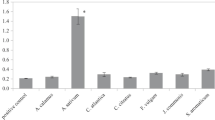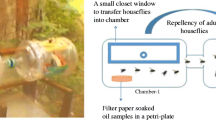Abstract
This study aimed to evaluate for the first time the insecticidal effects of essential oils of bergamot (Citrus bergamia), palmarosa grass (Cymbopogon martini), vetiver grass (Vetiveria zizanioides), and red cedar (Juniperus virginiana) against the house fly (Musca domestica). The in vitro study was performed in captured adult flies, which were separated on testing cages (n = 20). Subsequently, the essential oils cited above were used in the concentrations of 1, 5, and 10%, and a control group was maintained for test validation. All flies were monitored for 8 h after treatment. All four oils showed insecticidal effect against the fly species studied in vitro and after 8 h of treatment, an efficacy of 73% was observed for the essential oil of bergamot, 55% for palmarosa grass, 75% for vetiver grass, and 89% for red cedar. We conclude that the essential oils tested showed insecticidal effect against house fly, acting as an environmentally sustainable alternative to be applied in human habitats, especially against flies’ resistant to chemical insecticides. In addition, the use of such oils may decrease the doses of synthetic drugs routinely used.


Similar content being viewed by others
References
Aarthi N, Murugan K (2010) Larvicidal and repellent activity of Vetiveria zizanioides L, Ocimum basilicum Linn and the microbial pesticide spinosad against malarial vector, Anoplheles stephensi Liston (Insecta: Diptera: Culicidae). J Biopesticides 3:199–204
Agnolin CA, Olivo CJ, Leal MLR, Beck RCR, Meinerz GR, Parra CLC, Machado PR, Foletto V, Bem CM, Nicolodi PRSJ (2010) Eficácia do óleo de citronela [Cymbopogon nardus (L.) Rendle] no controle de ectoparasitas de bovinos. Rev Bras Plantas Med 12:482–487
Akhila A (ed) (2009) Essential oil-bearing grasses: the genus Cymbopogon, 46. edn. CRC Press Taylor and Francis Group, New York 262 p
Amer A, Mehlhorn H (2006a) Repellency effect of forty-one essential oils against Aedes, Anopheles, and Culex mosquitoes. Parasitol Res 99:478–490
Amer A, Mehlhorn H (2006b) Larvicidal effects of various essential oils against Aedes, Anopheles, and Culex larvae (Diptera, Culicidae). Parasitol Res 99:466–472
Béjar V, Chumpitaz J, Pareja E, Valencia E, Huamán A, Sevilla J, Tapia M, Saez G (2006) Musca domestica como vector mecánico de bacterias enteropatógenas en mercados y basurales de Lima y Callao. Rev Peru Med Exp Salud Publica 23:39–43
Cárcamo MC, Silva AZ, Ribeiro PB, Menezes AMD (2007) Ação do citral e citronelal sobre larvas de Lucilia sericata (meigen, 1926) (diptera: calliphoridae), em condições de laboratório. In: Congresso de Iniciação Científica da UFPEL – Pelotas. Anais eletrônicos
Cavaleiro C, Salgueiro LR, Cunha AP, Figueiredo AC, Barroso JG, Bighelli A, Casanova J (2003) Composition and variability of the essential oils of the leaves and berries from Juniperus navicularis. Biochem Syst Ecol 31:193–201
Chagas ACS (2004) Controle de parasitas utilizando extratos vegetais. Rev Bras Parasitol Vet 13:156–160
Chagas ACS, Passos WM, Prates HT, Leite RC, Furlong J, Fortes ICP (2002) Efeito acaricida de óleos essenciais e concentrados emulsionáveis de Eucalyptus spp em Boophilus microplus. Braz J Vet Res Anim Sci 39:247–253
Chou ST, Lai C, Lin CC, Ying Shih Y (2012) Study of the chemical composition, antioxidant activity and anti-inflammatory activity of essential oil from Vetiveria zizanioides. Food Chem 134(1):262–268
Cosimi S, Rossi E, Cioni PL, Canale A (2009) Bioactivity and qualitative analysis of some essential oils from Mediterranean plants against stored product pests: evaluation of repellency against Sitophilus zeamais Motschulsky, Cryptolestes ferrugineus (Stephens) and Tenebrio molitor (L.) J Stored Prod Res 45:125–132
De Castro LO, Ramos RLD (2003) Principais gramíneas produtoras de óleos essenciais. Boletim Técnico da Fundação Estadual de Pesquisa Agropecuária. Boletim Fepagro. n.11
Deleito CSR, Borja GEM (2008) Nim (Azadirachta indica): uma alternativa no controle de moscas na pecuária. Pesqui Vet Bras 28:293–298
Duarte MCT, Figueira GM, Sartoratto A, Rehder VL, Delarmelina C (2005) Anti-Candida activity of Brazilian medicinal plants. J Ethnopharmacol 97:305–311
Duarte MCT, Leme EE, Delarmelina C, Soares AA, Figueira GM, Sartoratto A (2007) Activity of essential oils from Brazilian medicinal plants on Escherichia coli. J Ethnopharmacol 111:197–201
Farias MPO, Barros FN, Alves LC, Faustino MAG (2009) Eficácia do óleo da semente de andiroba (Carapa guianensis) sobre larvas de Musca domestica (diptera: muscidae) por meio do teste de imersão. Jornada de Ensino, Pesquisa e Extensão da UFRPE
Fisher K, Phillips C (2008) Potential antimicrobial uses of essential oils in food: is citrus an answer? Trends Food Sci Technol 19:156–164
Freitas SR (2008) Bioatividade de Extratos Aquosos de Eucalyptus Sp. L'hér. (Myrtaceae) E Melia Azedarach L. (Meliaceae) Sobre Musca domestica L. (Diptera, Muscidae). Dissertação: Programa de Pós-Graduação em Parasitologia da Universidade Federal de Pelotas, Pelotas
Hong S, Choi J, Kim S (2011) Herbicidal activity of essential oil from Palmarosa (Cymbopogon martini). Korean J Weed Sci 31:96–102
Jirovetz L, Buchbauer G, Schmidt E, Stoyanova AS, Denkova Z, Nikolova R, Geissler M (2007) Purity, antimicrobial activities and olfactoric evaluations of geraniol/nerol and various of their derivatives. J Essent Oil Res 19:288–291
Kim SS, Baik JS, TH O, Yoon WJ, Lee NH, Hyun CG (2008) Biological activities of Korean Citrus obovoides and Citrus natsudaidai essential oils against acne-inducing bacteria. Biosci Biotechnol Biochem 72(10):2507–2513
Klauck V, Pazinato R, Stefani LM, Santos RC, Vaucher RA, Baldissera MD, Raffin R, Boligon A, Athayde M, Baretta D, Machado G, Da Silva AS (2014) Insecticidal and repellent effects of tea tree and andiroba oils on flies associated with livestock. Med Vet Entomol 28:33–49
Kumar R, Srivastava M, Dubey NK (2007) Evaluation of Cymbopogon martinii oil extract for control of postharvest insect deterioration in cereals and legumes. J Food Prot 70:172–178
Lamiaa B, Lebbadi M, Ahmed A (2007) Bacteriological analysis of Periplaneta americana L. (Dictyoptera; Blattidae) and Musca domestica L. (Diptera; Muscidae) in ten districts of Tangier, Morocco. Afr J Biotechnol 6(17):2038–2042
Lee H (2006) Mosquito larvicidal activity of aromatic medicinal plant oils against Aedes aegypti and Culex pipiens pallens. J Am Mosq Control Assoc 22:292–295
Makhaik M, Naik SN, Tewary DK (2005) Evaluation of anti-mosquito properties of essential oils. J Sci Ind Res 64:129–133
Merle H, Moron M, Blazquez M, Boira H (2004) Taxonomical contribution of essential oils in mandarin cultivars. Biochem Syst Ecol 32:491–497
Moufida S, Marzouk B (2003) Biochemical characterization of blood orange, sweet orange, lemon, bergamot and bitter orange. Phytochemistry 62:1283–1289
Nuchuchua O, Sakulku U, Uawongyart N, Puttipipatkhachorn S, Soottitantawat A, Ruktanoncha U (2010) In citro characterization and mosquito (Aedes aegypti) repellent activity of essential-oils-loaded nanoemulsions. AAPS PharmSciTech 10:1234
Ozaki M, Takahara T, Kawahara Y, Wada-Katsumata A, Seno K, Amakawa T, Yamaoka R, Nakamura T (2003) Perception of noxious compounds by contact chemoreceptors of the blowfly, Phormia regina: putative role of an odorant binding protein. Chem Senses 28:349–359
Palavesam A, Guerrero FD, Heekin AM, Wang J, Dowd SE, Sun Y, Foil LD, León AAP (2012) Pyrosequencing-based analysis of the microbiome associated with the horn fly, Haematobia irritans. PLoS One 7:e44390
Pazinato R, Klauck V, Volpato A, Tonin AA, Santos RC, Souza ME, Vaucher RA, Raffin R, Gomes P, Felippi CC, Stefani LM, Da Silva AS (2014) Influence of tea tree oil (Melaleuca alternifolia) on the cattle tick Rhipicephalus microplus. Exp Appl Acarol 63:77–83
Pissinati A, Mikami AY, Marques CRG, Santos OJAP, Piva LB, Ozawa EKM, Camargo GT, Ventura UM (2009) Use of neem and kaolin on nymphs of whitefly in cabbage. Rev Bras Agroecol 4:1487–1490
Regnault-Roger C, Vincent C, Arnason JT (2012) Essential oils in insect control: low-risk products in a high-stakes world. Annu Rev Entomol 57:405–424
Romano L, Battaglia F, Masucci L, Sanguinetti M, Posteraro B, Plotti G, Zanetti S, Fadda G (2005) In vitro activity of bergamot natural essence and furocoumarin-free and distilled extracts, and their associations with boric acid, against clinical yeast isolates. J Antimicrob Chemother 55:110–114
Sangmaneedet S, Kanistanon K, Papirom P, Tesiri T (2005) Uses of Thai medicinal herb (Derris elliptica (Roxb.) Benth) in control of fly larvae population and its application in the treatment of cutaneous myiasis in animals. Khon Kaen Univ Res J 10:22–30
Srinivasan R, Jambulingam P, Gunasekaran K, Boonpathidoss PS (2008) Tolerance of house fly, Musca domestica L. (Diptera: Muscidae) to dichlorvos (76% EC) an insecticide used for fly control in the tsunami-hit coastal villages of southern India. Acta Trop 105:187–190
Ugbogu OC, Nwachukwu NC, Ogbuagu UN (2006) Isolation of Salmonella and Shigella species from house flies (Musca domestica l.) in Uturu, Nigeria. Afr J Biotechnol 5:1090–1091
Vazirianzadeh B, Solary SS, Rahdar M, Hajhossien R, Mehdinejad M (2008) Identification of bacteria which possible transmitted by Musca domestica (Diptera: Muscidae) in the region of Ahvaz, SW Iran. Jundishapur J Microbiol 1(1):28–31
Author information
Authors and Affiliations
Corresponding author
Ethics declarations
This article does not contain any studies with human participants or animals performed by any of the authors.
Conflict of interest
The authors declare that they have no conflict of interest.
Rights and permissions
About this article
Cite this article
Klauck, V., Pazinato, R., Volpato, A. et al. Insecticidal effect of several essential oils against Musca domestica . Comp Clin Pathol 27, 167–172 (2018). https://doi.org/10.1007/s00580-017-2572-6
Received:
Accepted:
Published:
Issue Date:
DOI: https://doi.org/10.1007/s00580-017-2572-6




